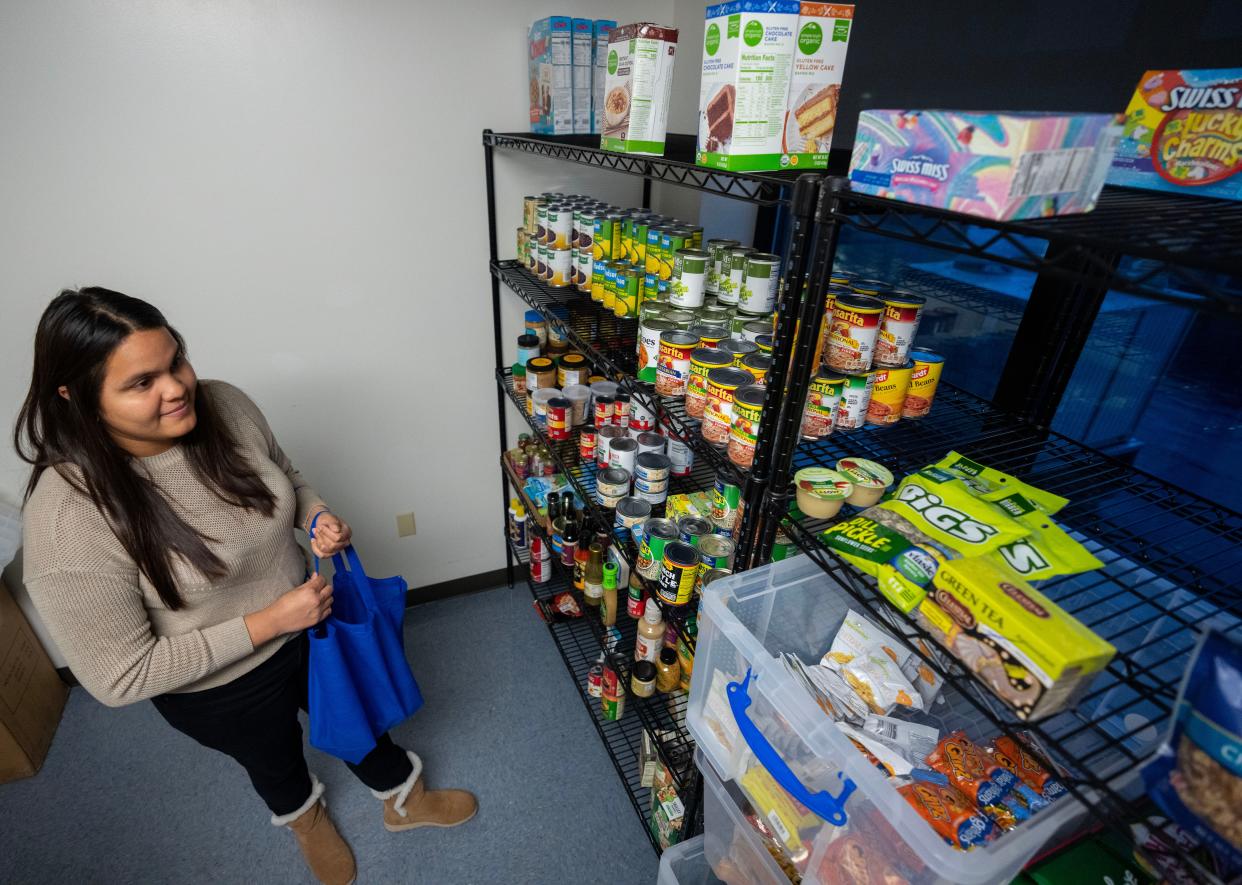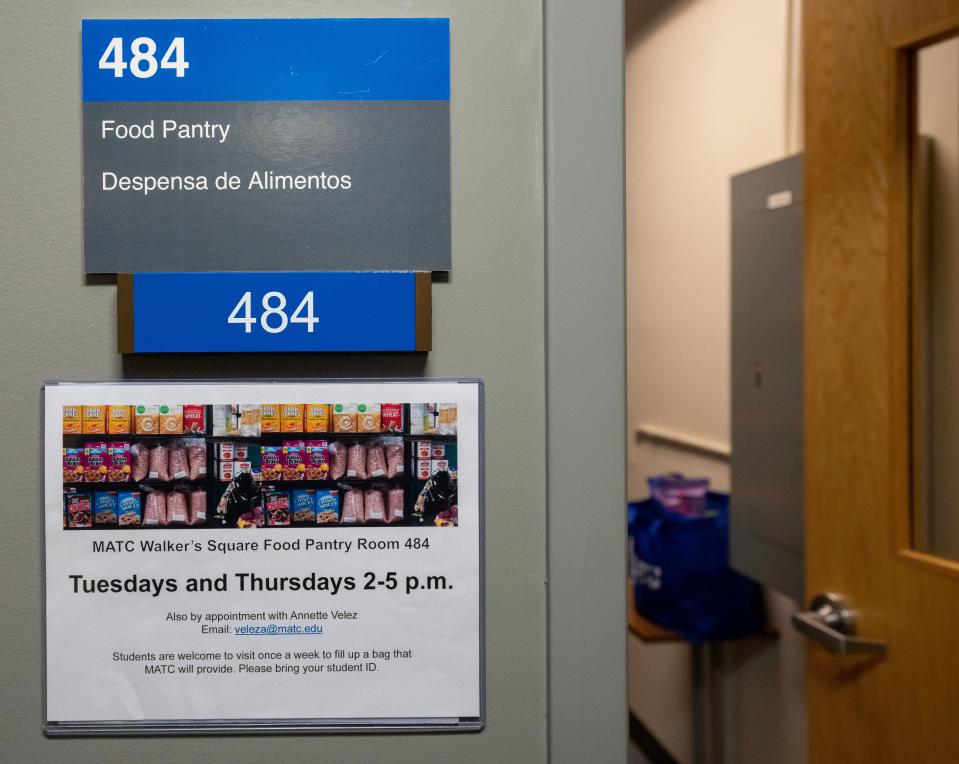'Some come every single day': Wisconsin college students' use of campus food pantries soars this year

A ribbon-cutting event for a former storage room marked a milestone for Milwaukee Area Technical College.
MATC converted the small space at its Walker's Square campus into a food pantry that opened Tuesday. It's the last of MATC's five campuses to open a food pantry for students, all of which launched within the last year.
The pantries couldn't have come at a better time.
Soaring food costs have college students feeling the pinch. The need is especially great at Walker's Square, which is on the near south side in the heart of Milwaukee’s Latino community. Many students at the campus are enrolled in the GED or English as a Second Language programs while working minimum wage jobs that don't provide enough to cover rent, gas, groceries and other expenses.
Equan Burrows, MATC's dean of student experience, said the college had previous iterations of food pantries, such as donated canned goods stocked in the corner of a room or breakfast bars slipped to hungry students.
But he said MATC's partnership with Feeding America is more formalized and ensures the school's long-term commitment to addressing food insecurity, a relatively widespread problem plaguing community colleges in which students don't have the resources to feed themselves nutritiously, or even at all.
"This is groundbreaking," Burrows said about the opening of pantries at every MATC campus. "And this is something we can sustain."

The need for the food pantries at MATC is 'higher than anticipated'
A survey conducted by Temple University’s Hope Center for College, Community and Justice illustrates the immense need for food pantries at MATC. Half of the school's nearly 2,700 survey respondents reported experiencing food insecurity in the previous 30 days. That's higher than the 39% of two-year students facing food issues nationally.
MATC opened the first food pantry at its downtown campus in November 2021. What started as a 500-pound weekly food order has grown to a 1,400 pound order — and that's without accounting for the addition of the Walker's Square campus.
At the downtown campus pantry alone, more than 1,200 visits have happened so far this semester, said Haley Weber, whose job as MATC's coordinator of student services is to remove barriers students face to earning their degrees. In addition to nonperishable items for pickup, the main campus also offers about 200 hot meals per week made by culinary program students using leftover food that would have otherwise gone to waste.
"The need has been even higher than anticipated," she said. "Some students come every single day for lunch."
The cost to the college is minimal, maybe $600 a month, Weber said. If Feeding America has a week in which donations are low, MATC buys food from the nonprofit at a reduced price.
The benefits of campus pantries are vast. Food insecurity is fundamentally a retention issue. Students without enough to eat are unlikely to be able to stay in school.
Among MATC's pantry shoppers was Ivonne Ruiz, a full-time student in the English as a Second Language program. With food prices so high, she said she limits what she buys to the bare essentials. The campus pantry helps supplement her groceries.
Another shopper who visits an MATC pantry at least once a week was a mom who said she doesn't receive enough in food stamps to feed herself and her three children.
Colleges and universities across Wisconsin seeing similar trends
Colleges across Wisconsin are hearing similar stories at their pantries: more visits and more students, which all of the schools attributed primarily to higher grocery prices.
At Madison Area Technical College, 464 student visits took place in the first three months of the fall 2021 semester, said student health educator Denise Holin. The same time period this fall brought 613 visits.
More than 1,000 Waukesha County Technical College students picked up bags from the school food pantry in 2019, said Stephanie McWilliams, the assistant director of student life. Since August, the school opened a second pantry location and has already handed out nearly 600 bags.
While food insecurity hits Black, first-generation and two-year college students hardest, four-year schools are also seeing stronger demand.
At the University of Wisconsin-Milwaukee, basic needs coordinator Allie Dorshorst said the spring 2022 semester brought about 100 students to the pantry per week. This fall, UWM is seeing an average of 230 students weekly. Inflation is a factor in the uptick, though she also said the school expanded its hours.
UW-Green Bay recorded roughly 150 visits per month before the pandemic, said Stacie Christian, the assistant vice chancellor of inclusive excellence. That increased to about 250 visits last spring and the pantry this fall is approaching an average of 400 monthly visits.
Contact Kelly Meyerhofer at kmeyerhofer@gannett.com. Follow her on Twitter at @KellyMeyerhofer.
Our subscribers make this reporting possible. Please consider supporting local journalism by subscribing to the Journal Sentinel at jsonline.com/deal.
DOWNLOAD THE APP: Get the latest news, sports and more
This article originally appeared on Milwaukee Journal Sentinel: Inflation drives more Wisconsin college students to food pantries

